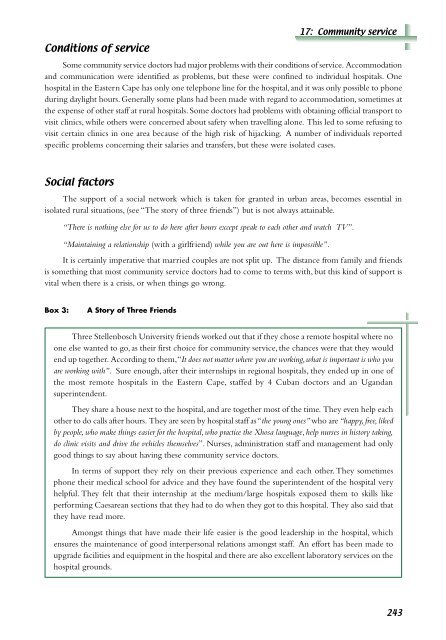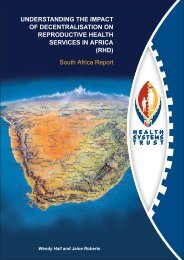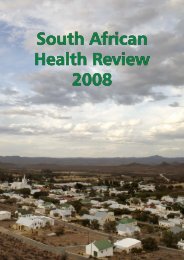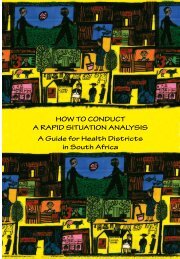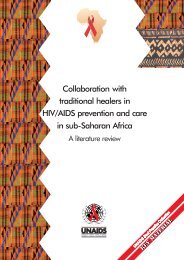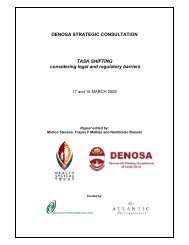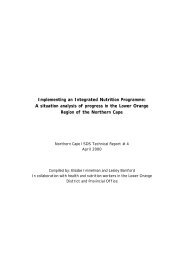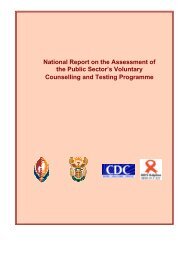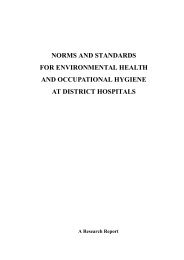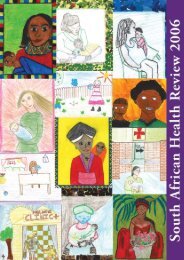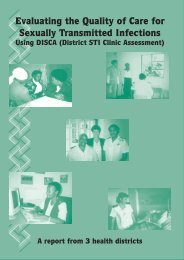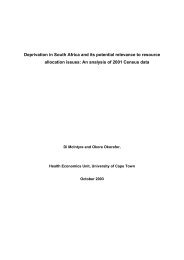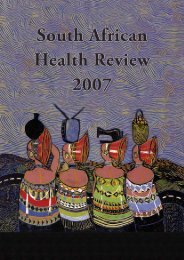Monitoring the implementation of community service
Monitoring the implementation of community service
Monitoring the implementation of community service
Create successful ePaper yourself
Turn your PDF publications into a flip-book with our unique Google optimized e-Paper software.
Conditions <strong>of</strong> <strong>service</strong><br />
17: Community <strong>service</strong><br />
Some <strong>community</strong> <strong>service</strong> doctors had major problems with <strong>the</strong>ir conditions <strong>of</strong> <strong>service</strong>. Accommodation<br />
and communication were identified as problems, but <strong>the</strong>se were confined to individual hospitals. One<br />
hospital in <strong>the</strong> Eastern Cape has only one telephone line for <strong>the</strong> hospital, and it was only possible to phone<br />
during daylight hours. Generally some plans had been made with regard to accommodation, sometimes at<br />
<strong>the</strong> expense <strong>of</strong> o<strong>the</strong>r staff at rural hospitals. Some doctors had problems with obtaining <strong>of</strong>ficial transport to<br />
visit clinics, while o<strong>the</strong>rs were concerned about safety when travelling alone. This led to some refusing to<br />
visit certain clinics in one area because <strong>of</strong> <strong>the</strong> high risk <strong>of</strong> hijacking. A number <strong>of</strong> individuals reported<br />
specific problems concerning <strong>the</strong>ir salaries and transfers, but <strong>the</strong>se were isolated cases.<br />
Social factors<br />
The support <strong>of</strong> a social network which is taken for granted in urban areas, becomes essential in<br />
isolated rural situations, (see “The story <strong>of</strong> three friends”) but is not always attainable.<br />
“There is nothing else for us to do here after hours except speak to each o<strong>the</strong>r and watch TV”.<br />
“Maintaining a relationship (with a girlfriend) while you are out here is impossible”.<br />
It is certainly imperative that married couples are not split up. The distance from family and friends<br />
is something that most <strong>community</strong> <strong>service</strong> doctors had to come to terms with, but this kind <strong>of</strong> support is<br />
vital when <strong>the</strong>re is a crisis, or when things go wrong.<br />
Box 3: A Story <strong>of</strong> Three Friends<br />
Three Stellenbosch University friends worked out that if <strong>the</strong>y chose a remote hospital where no<br />
one else wanted to go, as <strong>the</strong>ir first choice for <strong>community</strong> <strong>service</strong>, <strong>the</strong> chances were that <strong>the</strong>y would<br />
end up toge<strong>the</strong>r. According to <strong>the</strong>m, “It does not matter where you are working, what is important is who you<br />
are working with”. Sure enough, after <strong>the</strong>ir internships in regional hospitals, <strong>the</strong>y ended up in one <strong>of</strong><br />
<strong>the</strong> most remote hospitals in <strong>the</strong> Eastern Cape, staffed by 4 Cuban doctors and an Ugandan<br />
superintendent.<br />
They share a house next to <strong>the</strong> hospital, and are toge<strong>the</strong>r most <strong>of</strong> <strong>the</strong> time. They even help each<br />
o<strong>the</strong>r to do calls after hours. They are seen by hospital staff as “<strong>the</strong> young ones” who are “happy, free, liked<br />
by people, who make things easier for <strong>the</strong> hospital, who practice <strong>the</strong> Xhosa language, help nurses in history taking,<br />
do clinic visits and drive <strong>the</strong> vehicles <strong>the</strong>mselves”. Nurses, administration staff and management had only<br />
good things to say about having <strong>the</strong>se <strong>community</strong> <strong>service</strong> doctors.<br />
In terms <strong>of</strong> support <strong>the</strong>y rely on <strong>the</strong>ir previous experience and each o<strong>the</strong>r. They sometimes<br />
phone <strong>the</strong>ir medical school for advice and <strong>the</strong>y have found <strong>the</strong> superintendent <strong>of</strong> <strong>the</strong> hospital very<br />
helpful. They felt that <strong>the</strong>ir internship at <strong>the</strong> medium/large hospitals exposed <strong>the</strong>m to skills like<br />
performing Caesarean sections that <strong>the</strong>y had to do when <strong>the</strong>y got to this hospital. They also said that<br />
<strong>the</strong>y have read more.<br />
Amongst things that have made <strong>the</strong>ir life easier is <strong>the</strong> good leadership in <strong>the</strong> hospital, which<br />
ensures <strong>the</strong> maintenance <strong>of</strong> good interpersonal relations amongst staff. An effort has been made to<br />
upgrade facilities and equipment in <strong>the</strong> hospital and <strong>the</strong>re are also excellent laboratory <strong>service</strong>s on <strong>the</strong><br />
hospital grounds.<br />
243


